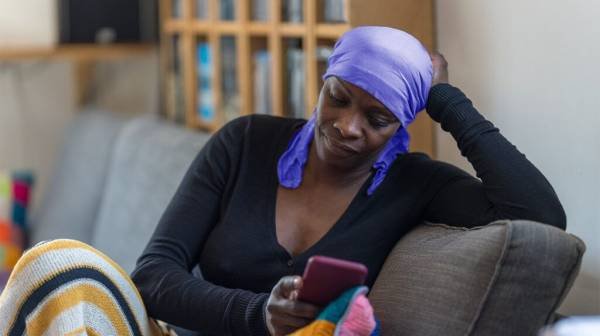
Share on PinterestWomen may need a different approach to hypertension control compared to men as they age, and digital health systems could help achieve that. Image credit: Daniel Llao Calvet/Getty Images
- An integrated digital health system involving a mobile device app and a blood pressure monitor proved effective in lowering participants’ blood pressure in a new study.
- The digital intervention was particularly effective for women, including women of perimenopausal and menopausal age, who had high blood pressure.
- Menopause is a time of heightened cardiovascular risk, so interventions such as this are a welcome innovation.
- Such digital health systems appear to be more effective for women due to their greater engagement with the systems, compared to men.
An “mHealth” system for controlling blood pressure resulted in meaningful reductions in systolic and diastolic blood pressure for participants in a new study, whose findings appear in the American Journal of Preventive Cardiology.
Women experienced the greatest benefit, including those at perimenopause, menopause, and postmenopause.
Greater control of blood pressure during these times of life for women is particularly important, as these are periods during which cardiovascular risk is especially high, with hypertension being a leading risk factor for cardiovascular disease.
Although women in these groups began the study from a higher blood pressure baseline, they experienced similar reductions as other women in the study.
The system tested during the study was designed by HelloHeart, which paired their heart health app with a Bluetooth-enabled blood pressure monitor.
There were approximately 48,000 participants in the study, which lasted from July 2015 to September 2023.
Cardiovascular disease is a leading cause of death for women globally, and it affects 60 million women in the United States. In spite of this, it is considered understudied and, ultimately, undertreated.
Of the participants in the study, 55% were women, making the study, according to HelloHeart, “one of the largest studies of a digital health intervention’s impact on women’s health to-date.”
Together, the app and blood pressure monitor allowed participants to track their blood pressure, heart rate, cholesterol, and medication. They also received medication adherence reminders, as well as AI-driven, evidence-based personalized lifestyle digital coaching, personalized health reports, and clinically-based, sex-specific guidance.
Individuals in the study who had very high blood pressure of greater than 140 mmHG systolic, experienced sustained reductions of 12 months, again exceeding the reductions experienced by similar male counterparts.
How menopause affects cardiovascular risk
Cardiologist Jayne Morgan, MD is Vice President of Medical Affairs for Hello Heart. She explained to Medical News Today why menopause is a time of particular cardiovascular risk, saying that:
“Menopause is a time of estrogen loss. Estrogen receptors are not just in the uterus, ovaries, and breasts as we are led to believe, but in all organs of a female’s body, particularly the heart.”
Morgan added that estrogen is a direct cardio-protectant agent, and also delivers significant anti-inflammatory benefits for women.
“This is why heart attacks occur in women at only half the rate of men prior to menopause,” said Morgan, “then double to equal men after menopause.”
In addition, estrogen receptors exist on all of the body’s vessels, and with its loss, vessels become less pliant, leading to elevated blood pressure during perimenopause and menopause.
“This can occur even in women with previously lifelong normal blood pressure readings,” Morgan noted.
Changes in estrogen also occur during pregnancy, as it can reveal underlying blood pressure issues but “menopause is a big inflection point,” said Rigved Tadwalkar, MD, FACC, a consultative cardiologist and director of Digital Transformation Pacific Heart Institute, who was not involved in the study.
Heart health: Different interventions for women vs. men
In the study, women with stage 2 hypertension achieved a 9% greater reduction in systolic values than men, said Morgan by way of example.
She added that the better result for women is likely that they are more likely to closely adhere to an mHealth program.
Morgan is co-author of an additional study looking specifically at how midlife women and men interact with such digital health interventions. This study’s results were presented at the American College of Cardiology’s 2025 scientific sessions, and they have not yet appeared in a peer-reviewed journal.
Since apps can track how often they are used, they can measure the degree to which their users interact, or engage, with them. This study showed that the higher a user’s engagement was, the more likely they were to lower their blood pressure over time.
Women had higher engagement levels and exhibited greater reductions in systolic blood pressure, suggesting that engagement was likely at least partially a factor in the success of such an mHealth program.
This second study concluded that “[e]ngagement partially mediated the relationship between sex and [blood pressure] reduction, indicating app engagement could improve clinical outcomes and underscoring the potential of mHealth technology to support individuals during this period of increased [cardiovascular] risk.”
Is mHealth the future for cardiovascular interventions?
“I think mHealth has real staying power,” Tadwalkar told MNT. “For hypertension, in particular, it’s a game changer because success depends on daily behaviors like checking your pressure, taking meds, and making small lifestyle adjustments. Having that feedback and coaching right on your phone makes it easier to stick with it.”
Looking beyond cardiovascular health, Tadwalkar continued, “it’s not just blood pressure“ that could benefit from access to digital health systems.“
“Diabetes, cholesterol, weight management — these are all conditions where small, steady changes add up, and digital health can really help people stay accountable,” he added. “It’s not a substitute for seeing your doctor, but it’s a strong complement.”
How to preserve heart health as we age
Although hypertension can be inherited, said Tadwalkar, “day-to-day choices carry a lot of weight.”
He recommended maintaining a balanced diet that’s not too heavy on salt, drinking alcohol only in moderation, taking care to manage stress, and keeping a healthy weight.
“All of that makes a big difference,” he said.
“For women, extra attention is needed around menopause,” Tadwalkar cautioned, “when the risk of high blood pressure ramps up. That’s the time to be even more vigilant about monitoring at home, sticking to heart-healthy habits, and working with tools that give consistent feedback.”
“It’s a period of higher risk,” he said, “but it’s also concurrently a window of opportunity to prevent bigger problems later.”





